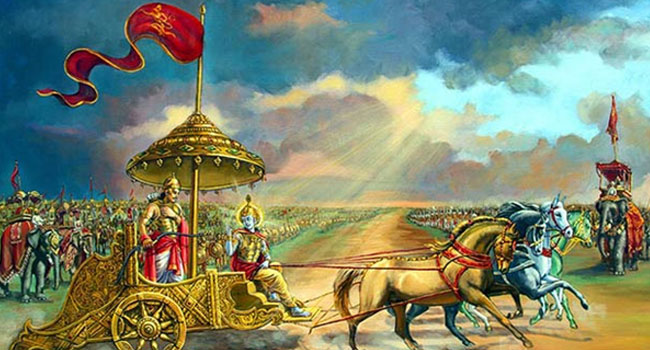5 Modern Day Management Lessons to Adopt from Shri Krishna this Janmashtami
Mahabharata, the longest epic focused on the war strategy. This epic war was between the two clans – Pandavas and Kauravas holds verses of Bhagavad Geeta. The texts in Bhagwad Geeta, as spoken by the Lord Shri Krishna preach us on the need to work righteously which unfolds the supreme message of management: “worship your work and imbibe always in work, even gods cannot live without work. Work should always be done after comparing with different sources, whether one is doing the work is right from all the sides, what would be repercussions of that work and how can be the body, mind and soul can be benefited with the kind of work one does.”
This Janmashtami, take a look at 5 modern day management lessons that Lord Shri Krishna taught us.
1. Standing up for your team and people
The legend has it; The Gopalas in Mathura were predominantly the worshipers of Lord Indra (the king of all Devatas). Back then, young Krishna suggested the Gopalas worship the Govardhana hill. Explaining to them the reasons, he stated how worshipping the hill may help them. This includes providing food for cows etc.
Knowing this, the Lord Indra got furious and decided to unleash havoc in the form of Samvartaka clouds, and thereby ordering to rain them heavily. This led to terrible rains in the village along with thunders that ravaged the whole place for nearly a week. It was then the Lord Krishna lifts up the Govardhan hill to provide shelter for people. This shattered Indra’s false pride into pieces. He had to call back all the clouds and thereby surrendering to Krishna’s resilience for the villagers.
Lesson:
A leader should always be standing with his people. The job of a leader is to show the right path and be there unconditionally the people.
2. Cultivating Core Values:
Core principles are defined by ethics that in turn defines moral principles governing a person’s behaviour. There can be no better example than the Krishna himself who cultivated strong core values amongst the people within who were on the side of Pandavas.
Pandavas’ core values were cultivated by Lord Krishna itself, basing it purely on ‘Dharma’ that is reinstated upon the truth. If observed closely, truth stood as the most important value system that was followed all through by the Pandavas. Collectively, a value system based upon the truth and the Dharma denotes righteousness in every task that is done. Perhaps, this is the base of the entire Bhagavad Gita wherein Krishna preaches Arjuna the lessons of righteousness and truth.
Such righteousness gives the strength and the motivation to the whole army on the battlefield. This has also laid the foundation for truth and Dharma. These core values have defined what the Pandavas are and how important these values were in winning their battle against the mighty Kauravas.
Lesson:
Sticking to core values pays off. The motif of values in Mahabharata implies that Dharma and truth in business scenarios will make you win mental and competitive battles, both.
3. Ease of Accessibility for your people
The manager, the leader, the one at the helm of affairs should be easy to approach. It should be such that the ones facing any challenge should be able to approach him easily. For Lord Krishna, he was accessible to both – Arjuna or Duryodhana. There was no hesitation for anyone seeking help from Shri Krishna.
Now comes the tricky part of whether or not to help, and then how to help. For this one is required to be clear about the ‘Dharma’. Shri Krishna helped both the sides – Pandavas and Kauravas. For Duryodhana, he gives him his entire army. For Arjuna, he becomes a personal charioteer.
He granted the privilege of accessing the opposition as well. Consider this – Sisupala was given the liberty to abuse him publically. Though, there was a quota, such that when it is exceeded, it results in his death.
Lesson:
The real leaders are the ones who are invariably accessible for everyone, regardless of the friends and foes. And a true leader will always be aware of his ‘Dharma’ that will guide him throughout all the decisions. For any challenges that one faces, anyone, can reach out easily to seek guidance.
4. Vision and Mission
To deliver results, there needs to be a certain vision and a mission that makes you achieve that. The vision and mission play an important role in the goal of seeing and the delivering the required. The vision was greed-free – winning the war without the greed of power, state, or resource. The mission was clear enough – revenge!
Upon carefully reading the events of the Mahabharata epic, Krishna comes upon as an eminent strategist. He is the one who can successfully keep Draupadi’s frustration under control. He was well aware of the fact that Kauravas won’t let Pandavas regain their kingdom peacefully. It was Krishna who decided that only war can decide the fate.
In the battle that ensues, he virtually leads the 7 divisions of Pandavas’ army to a decisive win against the 11 divisions of Kauravas’ army.
Krishna was successful in blending the cause of limited army of Pandavas to the greater cause of war. In fact, Shri Krishna was successful in fusing their dignity with the dignity of the people which gained them mass support. Perhaps this was the reason why Pandavas were equipped with highly motivated armies. They were collectively fighting their own war with a common mission. On the contrary – Kauravas came into the war with personal motives and a total lack of vision. And those personal motives failed to infiltrate among their soldiers wherein they fought being disconnected rather than a team.
Lesson:
Always align your mission and vision with that of your employees and people in the organization. This allows you to move together over a common goal with equal strength and determination.
5. Stick to your Goals and Work Culture:
Anyone with fair knowledge of Bhagavad Gita will be aware of three definite life goals that Lord Krishna has set for himself. Every good manager in the organization will have definite goals and an adequate work culture that helps to attain such goals. The three goals as defined by Shri Krishna involves;
- ‘Paritrayana Sadhunam’ – This means welfare for good;
- ‘Vinashaya Dushkritam’ – This means destruction of destroying an evil (thoughts and acts)
- ‘Dharma Sansthapana’ – This stands of establishing and strengthening the good principles.
Krishna as a manager gave us an idea of how having clear goals in the organization can help one to stay focused. The work culture involves creating a place where one can put active and rigorous efforts in pursuit of given or chosen tasks.
Also, Shri Krishna mentions two kind of work culture and the same can be applied in the organization.
- Daivi Sampat: This forms a divine work culture where the Dharma is given utmost priority and activities are performed in a righteous manner. To achieve the above-mentioned goals, it is ideal to create a divine work culture. This work culture involves self-control, fearlessness, sacrifice, straightforwardness and transparency amongst the peers.
- Asuri Sampat: This is a demonic work culture involving egoism, personal desires, and improper performance. The absence of Dharma in such a work culture makes it difficult to achieve the set goals.
Big enterprises are always skewed towards the Daivi Sampat work culture to become a world-class enterprise that helps to tap the potential avenues.
This Janmashtami, bring in such values in your organization that helps you to grow along with your subordinates who are with you on the journey. The real devotion, as said by Lord Krishna, lies not in chanting his name or praying in front of his idol, but in adopting the ‘gyaan’ that he preaches.

Shrijay Sheth
Shrijay, co-founder of LegalWiz.in, is best known for his business acumen. On this platform, he shares his experiences backed by a strong understanding of digital commerce businesses. His more than a decade-long career includes a contribution to some of the highly successful startups and eCommerce brands across the globe.

